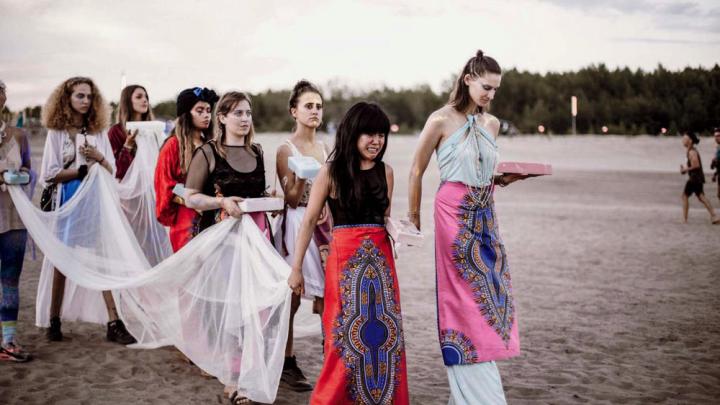Tension crackled through the audience, which was clumped in a circle in the Frankfurt Conference Center. At the center of the group, Lena Chen ’09, an artist and writer, paced like a cat around a bed, scanning nervous faces for her next victim. A camera trained on her face projected her image onto the back wall, as she led each chosen person to the bed, before inviting him or her to pick one of the several notebooks fanned out in a semi-circle on the floor: they are revealed to be Chen’s diaries. Then, sometimes coquettish, sometimes convivial, she read several entries, both intimate and mundane, aloud to the group.
The performance was part of the B3 Biennial of the Moving Image, hosted this past October in partnership with the Frankfurt Book Fair. Earlier, Chen and frequent collaborator Molly Baber (the videographer that evening) won an award for Best Emerging Talent for their video installation, Expose Her. For that project, Chen posed in her Berlin apartment as her recorded voice recited passages from some of those same diary entries, which recount how she has dealt with revenge porn—she became one of its first known victims—online harassment, and mental-health issues during the last 10 years.
Chen was raised in Los Angeles, the daughter of Chinese immigrants. At Harvard, she quickly became a campus celebrity as her blog, Sex and the Ivy, chronicled her sexual forays into the sometimes-dysfunctional world of Harvard undergraduate social life. Some readers were shocked. “I don’t think the actual content was controversial,” Chen recalls, “so much as the fact that I was writing so publicly as a woman of color—and that this was in 2008, when the types of writing that we’re used to, very confessional essays from women, wasn’t as common.”

With rituals that adapt to each city, Heal Her helps women process sexual trauma through art.
Photograph by Molly Baber
Concentrating in sociology, with a secondary in women, gender, and sexuality studies, Chen thrived at the newly founded Women’s Center, particularly in a seminar led by its then-director, Susan Marine. She says Marine taught her to understand that feminism “is not just about what you discuss in the classroom; it’s about how you incorporate this in your real life.” For Chen, it has become a guiding artistic principle. In 2018, she and Berlin-based artist Annique Delphine launched Heal Her, a traveling workshop that seeks to help survivors of sexual violence—so far, in six different countries—through “transformative storytelling”: communal, therapeutic, spiritual, and artistic techniques for helping women process sexual trauma through art. Facilitators lead the women in meditation, psychodrama, breathing exercises, and even neo-pagan rituals all focused on “opening up the body, psychologically, physically, [and] getting people into a safe state where they can start sharing their stories.” The resulting art objects, recordings, and writings will eventually become a collaborative show. Chen says her sociological training was central to creating workshops informed by the needs of those in attendance: “In every single community, they have their cultural methods, their localized approach toward: How do you talk about and deal with sexual violence?”
That is a question Chen herself has wrestled with ever since a 2007 event altered the course of her life. An ex-boyfriend posted nude photos of her on the Internet in an early instance of revenge porn, and years of harassment followed, especially by one anonymous cyber-stalker who also targeted undergraduate sex writers at other schools, predominantly those who were Asian women. The stalker was never caught.
After graduating, Chen began working full-time as an activist, organizing feminist conferences and events, and started writing a book—first memoir, then novel, but never published—about her experiences. But the strain of public exposure and the trauma and paranoia from her ordeal weighed on her. She was still being stalked online.
In 2012, she moved to Berlin in search of a new start. She assumed an alter ego, Elle Peril, and made her living modeling, often nude, for photographers and artists. At first, the new name was merely an escape from the reaches of Google. But as Chen began reading about feminist performance artists from the 1970s—particularly Sophie Calle, Lynn Hershman Leeson, and Carolee Schneemann—who had made their bodies into sites for conversations about women’s role in a changing society, she came to understand that by living as Elle Peril, she was also making art. “It started off as an extension of my writing practice,” Chen says of her alter ego. “Then it became a way for me to treat the trauma” by transforming it into artistic performances exploring the tension between her vulnerability and her power. She returns often to the refrain: “Who’s playing the artist, and who’s playing the muse?”
Her first solo show was a performance outside SOMA Gallery in Berlin in 2017. She read excerpts from her now-abandoned memoir as she stripped to nude on the street. Opportunities throughout Europe followed as she collaborated with dramaturges, photographers, videographers, sound engineers, and others on performances, installations, videos, and photography exhibitions exploring the slippery world of identity—which Chen calls “the ultimate creative project.”
Now she is making art under her original name, which she returned to after a nervous breakdown in 2016, precipitated by living between these two identities. “Basically, I lost track of myself,” she remembers. Today, she is enrolled in an M.F.A. program at the Carnegie Mellon University, and touring with shows like the one she took to the B3 Biennial. Though her alter ego has faded into the background, her art-as-activism remains all-encompassing. Chen’s body was once used against her, as a weapon of shame and degradation, but as an artist, she has regained control: “I have taken my trauma,” she says, “and I’ve transformed it into art.” That art is often shocking, precisely because it—like the revenge porn—blurs the boundaries between her private and public selves. It is both literally and figuratively embodied: Chen has taken hormone pills and used a breast pump to try to induce lactation; has invited the public into rituals held by her Berlin-based coven, practicing non-monotheistic spiritual traditions and witchcraft; and, in the case of the Frankfurt show, has laid bare every detail of her past.
Whether audiences experience her work in person or through video, Chen is driven by the potential for intimacy that, perhaps paradoxically, is a part of performance itself. “There’s always this impulse in me to reach inside people and do something more,” she says, “and break this barrier between what is performance, what is art, and what is reality.”







